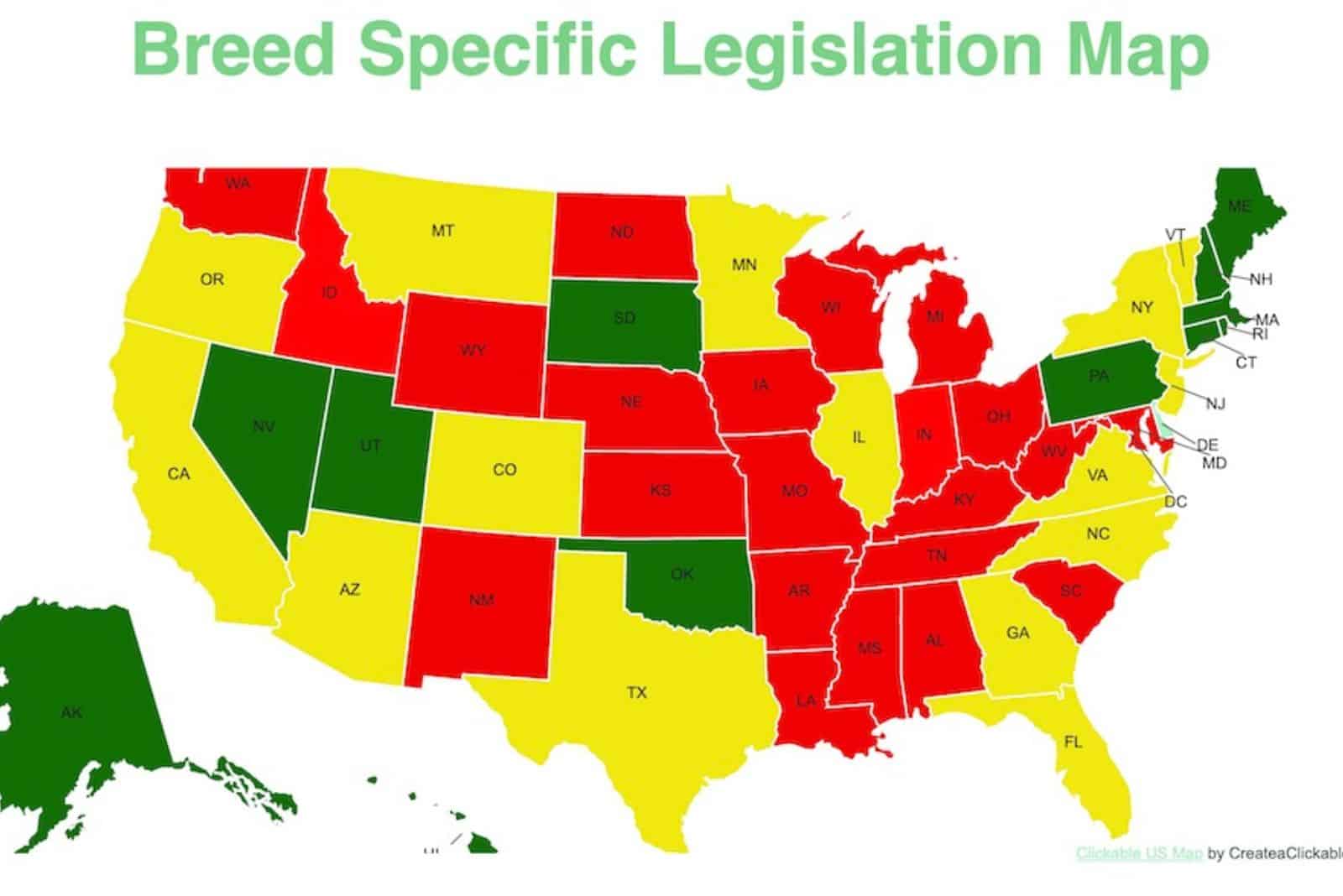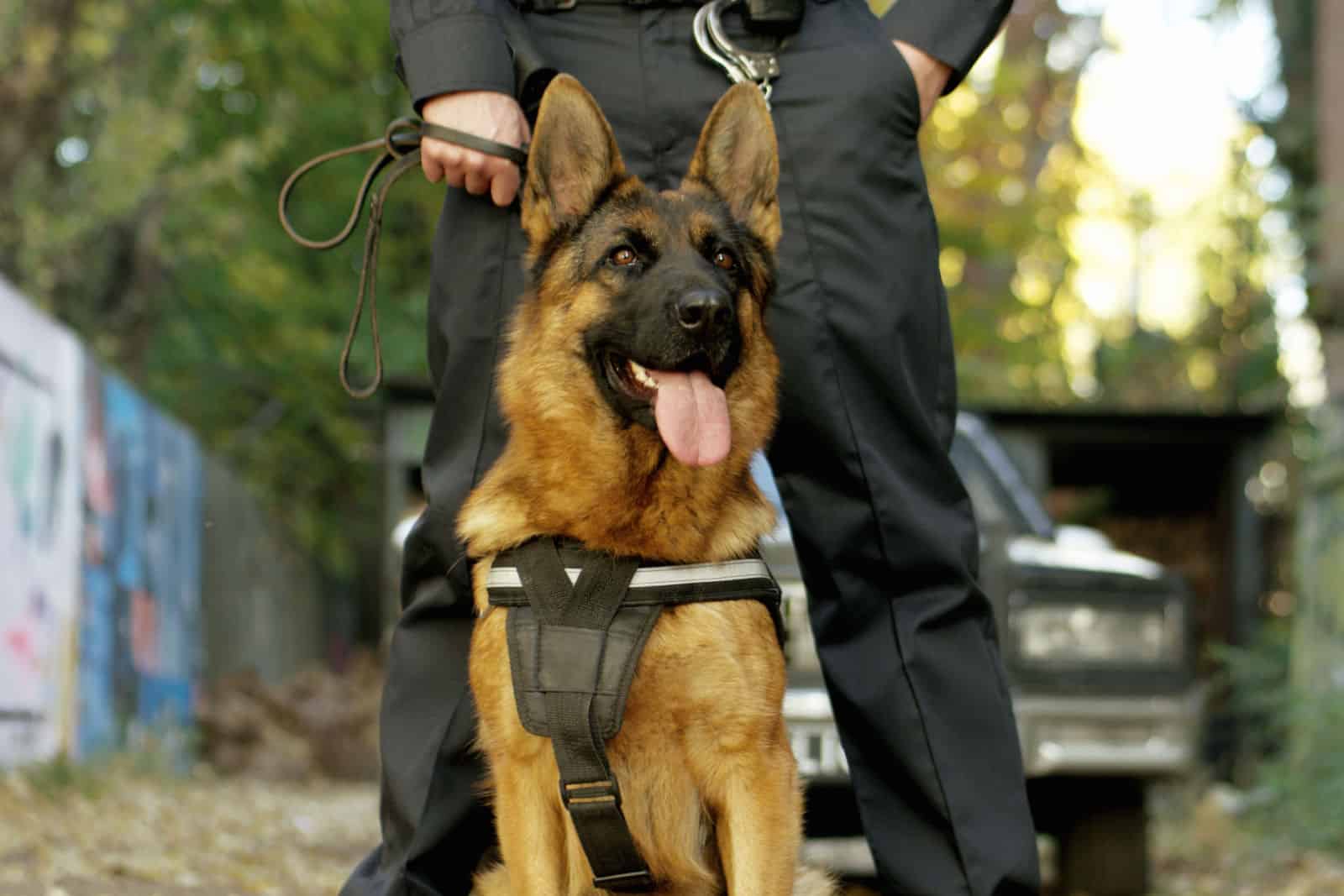Pitbulls are arguably the most contentious dog breed in the world. There are people who support them wholeheartedly, but on the other hand, there are also people who are totally against them and anything that goes with this breed.
What had to happen to make this breed so problematic and cause so much controversy?
The ugly truth lies in the breed’s history. To be perfectly candid, there has been a lot of negative aura surrounding the breed and situations that have happened that make you rethink everything.
Things have changed a lot, and Pitbulls are no longer trained to fight and attack; however, it is difficult to fight off the negative connotations that this name of the breed conveys.
Is it fair to judge the whole breed just because of the unfortunate history and events that occurred? Well, this is definitely a debate in and of itself, and I’ll let you think about it.
Our topic today is investigating whether Pitbulls are banned in the USA, and if so, where? To this day, there are many states and countries around the world that prohibit the ownership of Pitbull dogs.
Let’s look a little bit more into the current laws and see if it is illegal to own a Pitbull where you live.
Where Are Pitbulls Banned In The USA?

Disclaimer: As of January 2023, the data provided below is considered valid; however, due to the rapidly changing nature of the laws, we cannot fully guarantee that this will not change in the near future.
The situation with Pitbull bans in the USA, and laws against other “dangerous” dog breeds is a bit complicated, to say the least. In 2016, breed-specific legislation was in place in 36 states across the nation.
However, the situation is changing constantly since there are many petitions going around trying to revoke the law and lift the breed-specific ban against Pit Bulls.
For example, people from the city of Salina, in Kansas, have been collecting signatures for a city ordinance, hoping that the city will reconsider the ban against Pitbulls in this community. The petition is likely headed to the City Commission in the near future.
This is just one of the stories proving that communities are trying to do something about the current situation. As of January 2021, Pitbulls are no longer banned in the city of Denver, ending thus a 31-year-long ban that prohibited the ownership of Pitbulls in the said city.
Now, you are allowed to own one if you obtain a permit, microchip the animal, and comply with the prescribed requirements.
That being said, there are plenty of organizations, such as the National Pitbull Victim Awareness (NPBVA) that advocates for victims of Pitbull attacks, breed-specific legislations, and non-profit organizations.
If we look at the breed-specific legislation map of the USA, we can see that there is a difference between the states in red and the states in yellow.

The red states signify that there is currently a BSL being enforced without any prohibitions, whereas yellow means that there is some sort of law that prohibits the BSL from being enforced; however, there might be some exceptions to the rule which allow the law being enforced.
The states in red include Washington DC, Idaho, Wyoming, New Mexico, North Dakota, Nebraska, Kansas, Iowa, Missouri, Arkansas, Louisiana, Wisconsin, Michigan, Indiana, Ohio, Kentucky, Tennessee, Mississippi, Alabama, West Virginia, South Carolina, and Maryland.
The states in yellow include Oregon, California, Montana, Colorado, Texas, Minnesota, Illinois, New York, Vermont, New Jersey, Virginia, North Carolina, Georgia, and Florida.
Breed-Specific Legislation
According to the American Society for the Prevention of Cruelty to Animals (ASPCA), the Breed-Specific Legislation (BSL) is a “blanket term” for all laws that restrict the ownership of particular kinds of dogs and dog breeds that are deemed aggressive and dangerous.
These laws were enforced in the first place to try to decrease the amount of dog attacks on humans and other animals; however, this proved to be not exactly the very best way to do so. These laws are commonly referred to as breed-discriminatory laws.
The breed of dog most affected by this law is certainly all types of Pitbulls; American Pitbull Terrier, American Staffordshire Terrier, American Bully, and Staffordshire Bull Terrier.
Other dog breeds might be included also, such as American Bulldog, Doberman Pinscher, Rottweiler, Dogo Argentino, Cane Corso, Chow Chow, Boerboel, Presa Canario, Neapolitan Mastiff, Wolf hybrids, and their many mixes.
The legislation might ban the breed altogether, call for automatic labeling (declaring the breed as dangerous), or call for mandatory spaying/neutering, licensing, muzzling, and many more.
The legislation first made its appearance in the 1980s as a response to the fatal dog attacks on community members. Recently, many states have realized that enforcing this law is very costly, and does not bring desired results, which is why it is very common to see this law actually being revoked.
What States Allow Pitbulls?

The following states allow Pitbulls, and have a law that prohibits a BSL from being enforced: Alaska, Arizona, Hawaii, Nevada, Utah, South Dakota, Oklahoma, Pennsylvania, Maine, New Hampshire, Massachusetts, Connecticut, Rhode Island, Delaware.
In May of 2022, the governor of Arizona, Doug Ducey, signed a new legislation that prevents a dog breed from being legally charged and blamed for a dog bite, and being seen as vicious. This bill also ended breed restrictions in housing insurance.
With the huge amount of local activists who are trying to change the law, we might even see a lot more of “Pitbull green states” in the near future.
Related: Gotti Pitbull – A Family-Favorite Pitbull Bloodline
Why Are Pitbulls Banned?
Pitbulls originated in the early 1800s, in the UK, from the Old English Bulldogs – a dog breed that was used in a cruel sport called “bull baiting”. Even though England prohibited this sport in 1835, the public simply continued with dog fighting, only this time, hiding from the law.
Shortly before the Civil War, Pitbulls made their way to America, where they were used mostly as companion dogs. Unfortunately, dogfighting started to come back in the 1980s, and Pitbulls once more found themselves at the center of this heinous and forbidden blood sport.
The dog that was once considered an “All American Dog” was now being exploited and trained to fight and kill. Many believe that the publication of a Time Magazine article, called, “The Pit Bull: Friend and Killer”, in the late 1980s, was a turning point for this breed.
It seems that this article only confirmed to the public that these dogs are dangerous, and that they should be feared and abandoned. This created an unfortunate stigma, which led to mass surrendering of these pups to shelters.
The media portrayal of the breed as being demonic and as a killer created the perfect opportunity for breed-specific legislation to take place, which is exactly what happened.
Fortunately, nowadays, these dogs are starting to get more positive media attention, and be seen as the lovely companion dogs that they once were. Hopefully, they will soon become, once again, a truly loved All American Dog!
Read also: How To Train A Pitbull Puppy Not To Bite — 11 Great Tips
Final Thoughts
Unfortunately, our answer to “are Pitbulls banned in the USA?” is still yes and no. There are many states that have started to revoke the ban / law, but there are still more than half of the American states that have certain breed-specific legislation enforced.
While writing this article, one quote was stuck in my head, “don’t judge the book by its cover”, and I think it fits this vibe perfectly. It is unfair to judge the whole breed because of its unfortunate history and certain individuals.
If these poor dogs were not used for that cruel sport in the first place, they might not have become so judged, aggressive, and hated by the public.
As it turns out, we humans are probably the root of the problem. The thought remains as to what would have happened if we didn’t get involved? Would these dogs have stayed the sweet companion dogs that they had every right to be?
If you do plan on adopting a Pitbull, we suggest that you first make sure that your city or state is Pitbull-friendly. Don’t forget to properly train your dog, and give him lots of love, attention, and affection.
What do you think about Pitbull bans? Would you sign a petition against them or for them? Let us know in the comments.
Read next: Are Pitbulls Good With Kids? This Article Is One Big Answer















